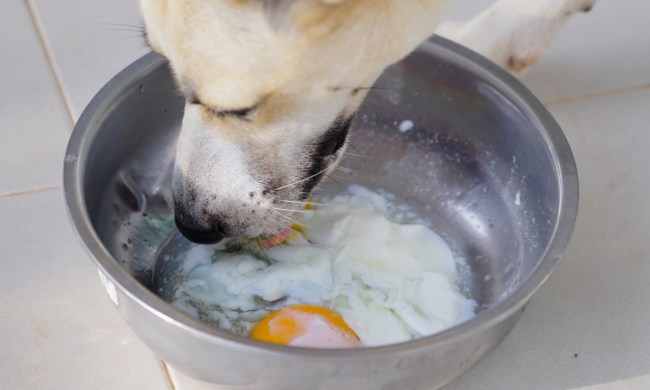
If you’ve followed human wellness and nutrition trends over the years, you likely know olive oil is the golden child of oils. Lauded for being a healthy fat that can protect against heart disease, even cardiologists recommend consuming olive oil. Yet, coconut oil has also come into favor recently for health benefits ranging from weight loss to immune system and improving cognitive functioning in people with dementia. Keyword: People.
What are the benefits of coconut oil for dogs? Are there even any? Is coconut oil safe for dogs? These are all excellent questions and ones to ask a vet before giving any human food to a pet, whether you’re allowing them to ingest the item or applying something topically. Some foods are toxic to pets, and topical application of some products can exacerbate the issues you want to fix. Where does coconut oil fit in? Here’s what we do (and don’t) know about coconut oil for dogs.
What is coconut oil?

As the name implies, coconut oil is derived from the meat, kernels, and milk of coconuts harvested from coconut palm trees. Commercial coconut oil is generally clear and thin, though solid, white-fat varieties are also available. Unrefined coconut oil has a distinct smell.
Coconut oil is 100% fat, most of which (80%-90%) is saturated. The primary fat in coconut oil is lauric acid. The oil also contains capric and caprylic acids. Coconut oil has medium-chain triglycerides (MCTs), which are generally considered “good” fats that can help lower cholesterol. The body absorbs MCTs quickly, turning them into energy.
However, there’s some controversy over whether lauric acid is an MCT or LCT, which the body doesn’t absorb as quickly. The distinction is significant, as the rate at which the body absorbs the fat is part of the reported benefits.
What are the benefits of coconut oil for dogs?

The truth is that we don’t really know that there are any. In fact, scientists are still working through the benefits for humans. Much of our research is based on coconut oil with 100% MCT, which differs from what you’ll find on grocery store shelves. Moreover, as mentioned above, there’s some controversy over how to classify lauric acid. TL;DR: The jury is out about the benefits of coconut oil for dogs (and people, for that matter).
That said, potential benefits might include the following:
- Antimicrobial and antiviral properties because of the lauric, capric, and caprylic acids
- Lower cholesterol because of the polyunsaturated and monounsaturated fats
- Brain health and mental function, potentially because of the polyunsaturated and monounsaturated fats
- Weight loss
- Dry skin repair and prevention when applied topically or as part of a shampoo
Does that mean you should run home and give your dog coconut oil as a food or topical treatment? No. Because there’s little data on coconut oil for dogs, your best bet is to ask your vet first. There may be some risks associated with coconut oil for dogs, too, including:
- Obesity
- Lack of nutrients
- Reduced interest in dog food
- Diarrhea
- Vomiting
- Skin irritation
- No change to viral or skin condition (false hope)
How to give coconut oil to a dog

Your vet will tell you whether coconut oil is a good idea for your dog and should provide guidance. Coconut oil can be given as an oral or topical treatment. Your vet might recommend that you:
- Choose unrefined (virgin) or cold-pressed coconut oil
- Prepare for trial and error — different oils have distinct tastes and smells, and not all dogs take to them
- Use coconut oil supplements for dogs
- Opt for skincare products formulated for dogs with coconut oil as an ingredient
- Apply topically once per week, letting the coconut oil set before rinsing off
- Watch for warning signs coconut oil is not suitable for your dog, such as GI discomfort or irritated skin
- Cease use and call them if the coconut oil exacerbates the dog’s condition, causes additional discomfort, or does not appear to improve the issue after a specific time
Final thoughts

Coconut oil has risen in popularity among humans because of its potential benefits for the immune system, weight loss, and cognitive function. However, scientists are still separating fact from fiction — and that’s just in the human population.
There’s even less data on the benefits of coconut oil for dogs. Conceivably, coconut oil may offer similar perks, like cognitive boosts, antiviral properties, weight loss assistance, and better skin for dogs. However, coconut oil may also have risks, including GI discomfort and obesity from all the added calories. Speak to your vet before giving your dog coconut oil. You may have more proven options like medicated topical shampoos for skin issues, medication for viruses, and diet and exercise for weight loss.



